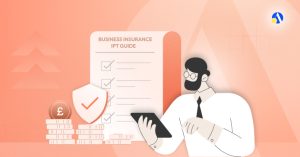Running a business comes with its fair share of expenses, so every pound you can legally claim back has a significant impact on your bottom line. Surprisingly, many business owners are unaware that certain types of insurance can be classified as tax-deductible business expenses, helping to lower their overall tax liability.
Before we dive deeper, take a look at some of the business expenses that you probably didn't know existed here.
By understanding which insurance premiums qualify as allowable business expenses, you could potentially save hundreds—or even thousands—of pounds each year. In this guide, we’ll break down what you can claim and how to maximise these opportunities to reduce your costs effectively.
Can I Claim Car Insurance as a Business Expense
If you use your vehicle for business activities, car insurance can be claimed as a tax-deductible expense. This includes driving to client meetings, making deliveries, or attending business events.
Eligible Expenses You Can Claim
- Insurance premiums related to business use
- Costs for repairs and servicing
- MOT test expenses
- Vehicle licensing fees
- AA or RAC membership fees
- Fuel costs (calculated based on business use)
- Parking charges incurred during business trips
- Congestion charges and toll fees for business travel
Please note: You can only claim the portion of your car insurance that applies to business use. For example, if 60% of your vehicle's usage is for business and 40% is personal, you can only deduct 60% of your insurance costs.
To ensure accuracy, maintain detailed mileage records that clearly distinguish between business and personal trips. These records will support your claims and help you calculate the exact percentage of your insurance expenses that are deductible.
Can I Claim Life Insurance as a Business Expense
Some types of life insurance can be classified as business expenses when arranged through your company:
- Relevant Life Insurance: Designed for employees or directors, with premiums eligible for tax relief.
- Key Person Insurance: Provides financial protection for the business if a crucial employee or director passes away; premiums are often tax-deductible.
- Death in Service Benefits: A group life insurance policy for employees, treated as a business expense without incurring corporation tax.
Important: Personal life insurance policies held in your own name don’t qualify as a business expense, even if you’re self-employed.
Can I Claim Health Insurance as a Business Expense
Health insurance can often be claimed as a tax-deductible expense for self-employed individuals and business owners, but the rules depend on your business structure.
Limited Company Directors
If you’re a director of a limited company, health insurance can be claimed as a business expense—but only if you opt for a business health insurance policy rather than a personal one. Keep in mind, however, that this benefit may be subject to Employers' National Insurance Contributions. Take a look at what`s changed under the new national insurance contributions regulations following the last budget here
Sole Traders
For sole traders, private health insurance is typically considered a personal expense and cannot be claimed as a business deduction.
What Health Insurance Typically Covers:
- Private medical treatments
- GP consultations
- Hospital stays
- Mental health support
- Dental and optical care (if included in the policy)
It’s important to note that health insurance covers medical expenses but doesn’t provide income replacement if you’re unable to work. For income protection, consider a separate income protection insurance policy.
Can I Claim Phone Insurance as a Business Expense
If you use your mobile phone for business, you may be able to claim phone insurance and other related expenses.
Eligible claims include:
- Phone insurance premiums
- Monthly contract fees
- Repair expenses
- Replacement devices
Important to note: You can only claim the portion of your phone costs directly related to business use. For example, if your phone usage is 70% business and 30% personal, you can claim 70% of the insurance and associated expenses.
To support your claim, keep records of business calls and data usage. If you have a phone exclusively for business purposes, you can claim 100% of the related costs.
What Cannot Be Claimed as a Business Expense
Knowing what you can’t claim is just as important as understanding what you can. HMRC has clear rules on allowable expenses:
- Personal expenses: You cannot claim for insurance that provides personal benefits rather than serving your business.
- Fines and penalties: Costs like parking fines, speeding tickets, or late payment charges are not tax-deductible.
- Entertainment costs: While client entertainment expenses are typically disallowed, staff entertainment may be an exception.
- Unreasonable or excessive costs: Any expense claims must be reasonable and directly related to your business needs.
Understanding these guidelines ensures your claims remain compliant and accurate.
Can Sole Traders Claim Car Insurance?
Sole traders can claim car insurance as a business expense, but only for the portion of vehicle use dedicated to business activities. To do so effectively, follow these steps:
- Keep detailed records of your mileage.
- Calculate the percentage of your total mileage used for business purposes.
- Apply this percentage to your overall car expenses, including insurance.
- Retain all relevant receipts and documentation.
For instance, if you drive 20,000 miles in a year and 12,000 of those are for business, you can claim 60% of your car insurance and related vehicle expenses. Accurate records and calculations are key to ensuring compliance and maximising your claim.
Can My Limited Company Pay for My Car Insurance?
Limited companies can cover directors' car insurance, but it’s important to be aware of potential tax implications:
- For business-only use: If the car is exclusively used for business purposes, the company can fully cover insurance costs as a tax-deductible business expense, with no benefit-in-kind tax to worry about.
- For personal and business use: If the car is also used for personal purposes, you may be liable for benefit-in-kind tax on the personal use portion. Additionally, the company will need to pay Class 1A National Insurance contributions.
- Company-owned vehicles: When the company owns the car, all associated insurance expenses are considered allowable business costs.
To ensure compliance and optimize tax efficiency, always consult a qualified accountant when managing company car benefits.
How Debitam Can Help You
Navigating business insurance claims and tax deductions can be complex, but you don’t have to tackle it alone. At Debitam, our expert accountants are here to help you:
- Identify eligible insurance expenses
- Accurately calculate business use percentages
- Maintain proper documentation
- Ensure full compliance with HMRC regulations
- Maximise your tax savings
We stay ahead of ever-changing tax regulations to help you claim what you’re entitled to while avoiding costly errors. With Debitam by your side, you can focus on growing your business while we handle the intricacies of tax planning and compliance.
Don’t leave money unclaimed—connect with our experts today to discover how much you could save.














